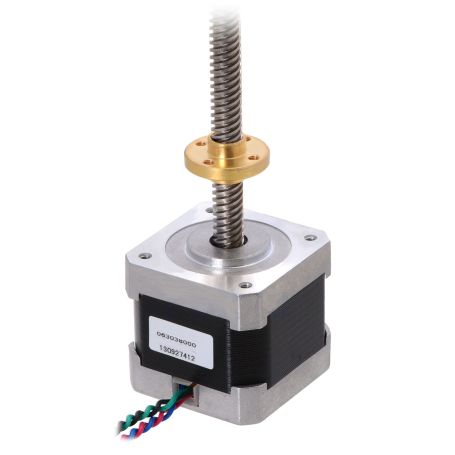Stepper Motor + 28cm screw, 200 pas
A stepper motor + screw 28cm, 4 wires, bipolar, 1.8° in steps, 200 steps.
Payments are secured by LyraCollect, a French payment collection company.
It is possible to delivered to your home, to a pick-up point or picked up by appointment at MCHobby
We prepare, pack and ship your orders with great respect and care.
Introduction
This hybrid bipolar stepper motor has two very interesting points:
- It has a threaded rod of 28 cm (+ nut) mounted directly on the axis
- It's a NEMA17 size motor... and therefore fits perfectly into our motor range.
An ideal tool for creating a linear precision linear loop actuator. The alloy nut (copper base) avoids seizure phenomena, has 4 fixing holes and moves 40 µm per full step. It is possible to obtain a better resolution by using a micro-stepping control. The stepper motor has a rotation angle of 1.8° per step and 200 steps/revolution. Each phase supports a current of 1.7 A at 2.8 Volts (but can be controlled with a higher voltage with a suitable controller.
To finish this introduction, the holding torque is 0.36N-m (3.7 kg-cm).
Use a stepper motor + 280mm screw shaft
This positioning motor and its threaded rod is within the range of 42x38 mm NEMA17 motor. The threaded rod is machined directly on the motor axis and replaces the usual axis. It becomes really easy to move an object or platform (linear motion) with a precision stepper motor. Stepper motors are particularly popular for use in 3D printers (ex: RepRap, OrdBot) and CNC machines. The threaded axis is 28cm stainless steel facing the stepper motor and since it is integrated into the motor itself, you don't need to make an assembly using a coupler (especially since this is not always easy to achieve).
The alloy nut (included with the motor), also known as "carriage nut" provides an assembly surface equipped with 4 holes for M3 screws. This nut is specially machined to pass through the hole of a NEMA17 support sold at MC Hobby. The nut moves 8.0 mm per full revolution of the axis (360° for 200 steps), which achieves a resolution of 0.040 mm per step. It is even possible to obtain smaller steps using a micro-stepping controller provided for bipolar stepper motors. We also recommend the use of a stepper motor controller DRV8825 to drive this motor, which achieves a resolution of 1.25µm per micro-step 1/32 step.
Note that this is not a ball nut (to compensate for the clearance between the nut and the threaded rod). The positioning accuracy is lost when the motor changes direction. This is the consequence of the backslash (shifting) when you change the direction of the motor, caused by the clearance, even minimal, between the nut and the threaded rod.
The maximum linear speed depends on many details of the system, including the charge and the motor supply voltage. Under ideal conditions (eg: with a gradual increase of the step rate, a higher supply voltage, and no charge), it is possible to reach a speed close to 30 cm/s.
The stepper motor at an angle of 1.8° per step (200 steps/revolution) and each phase uses 1.7 A at 2.8 V, developing a holding torque of 3.7 kg-cm (0.36 N-m). The motor is equipped with 4 color-coded wires and termnated with a JST XHP-4 connector (impaction of 2.54mm): black and green connected on a coil; red and blue connected on another. It can be controlled using a double H-Bridge (one H-Bridge per coil) but we recommend the use of a bipolar stepper motor driver.
This motor can be used with a MakerBeam NEMA17 support, or our NEMA17 right.
Characteristics
- Size: 42.3 mm square × 38 mm (excluding axis, NEMA17)
- Weight: 385 g
- Diameter of the axis: 8 mm with threaded rod
- Length of the axis: 28 cm
- Step per revolution: 200
- Linear displacement: 40 µm per complete step
- Current rating: 1.68 A per coil
- Voltage rating: 2.8 V
- Resistance: 1.65 Ω per coil
- Holding torque: 0.36 N-m (3.7 kg-cm)
- Inductance: 3.2 mH per coil
- Length of wires: 16 cm (approximately)
1 newton-meter is equal to 100 N-cm, or 10.1971621298 kg-cm (the force exerted by a weight of 10Kg at the end of an arm of 1 cm).
Typical applications of stepper motors
Stepper motors are used in many applications where precise positioning is desirable but without having to support the additional cost and complexity of a servo positioning system. Here are some applications where stepper motors intervene:
- Printer
- CNC machine
- 3D printer/ prototyping machine (ex. RepRap)
- Laser cutting machine
- A machine "Pick and place"
- Linear actuator
- A hard disc
Use with DRV8825
As mentioned above, it is possible to control this motor with the DRV8825. If you pay attention to the minimum voltage of the DRV8825, you will find that its minimum voltage is higher than the 2.8V needed for the motor. This is not a problem, you can use a 9V supply voltage as long as the current limitation is set correctly.
This motor can support a maximum current of 1.7A per coil. Without active cooling of the DRV8825, It is best to limit the current to 1.5A in the DRV8825, and thus also in the motor.
To resume: power 9V with current limitation at 1.5A. The 9V power supply must be capable of delivering 3 Amperes.
Tutorial
- The French tutorial on the DRV8825 stepper motor controller with Arduino.
- Arduino: Use a stepper motor with the motor Shield in (MCHobby.be, French).
- Raspberry: Control a stepper motor with an ULN2803 (MCHobby, French).
- Use a StepSick A4988 (stepper motor controller) with a motor










